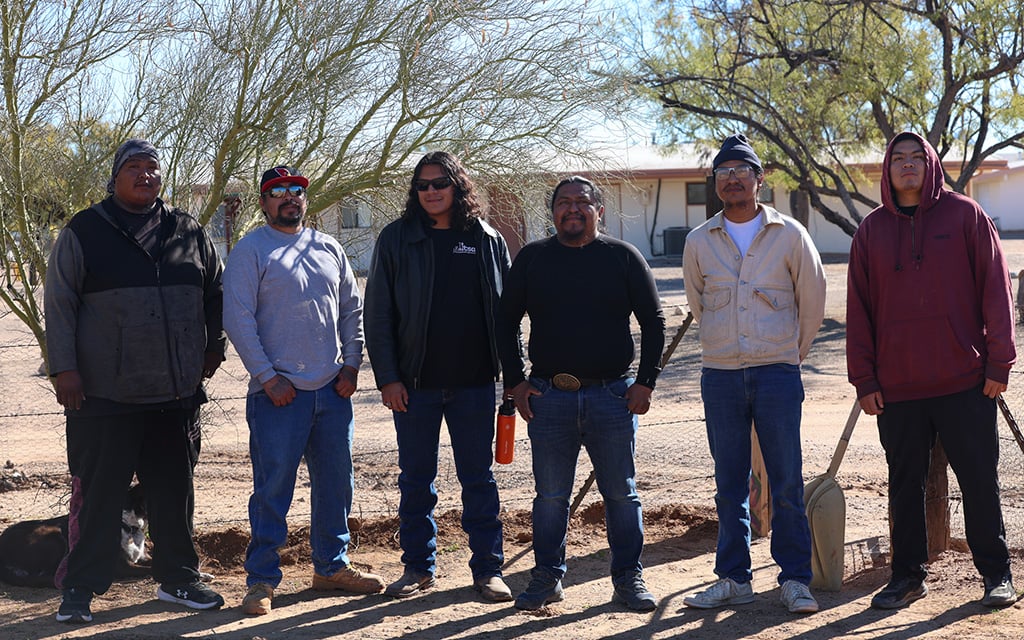
Sterling Johnson, third from right, poses in Ajo with a group of Ajo CSA farmers on Jan. 31, 2024. (Photo by Harris Hicks/Cronkite News)
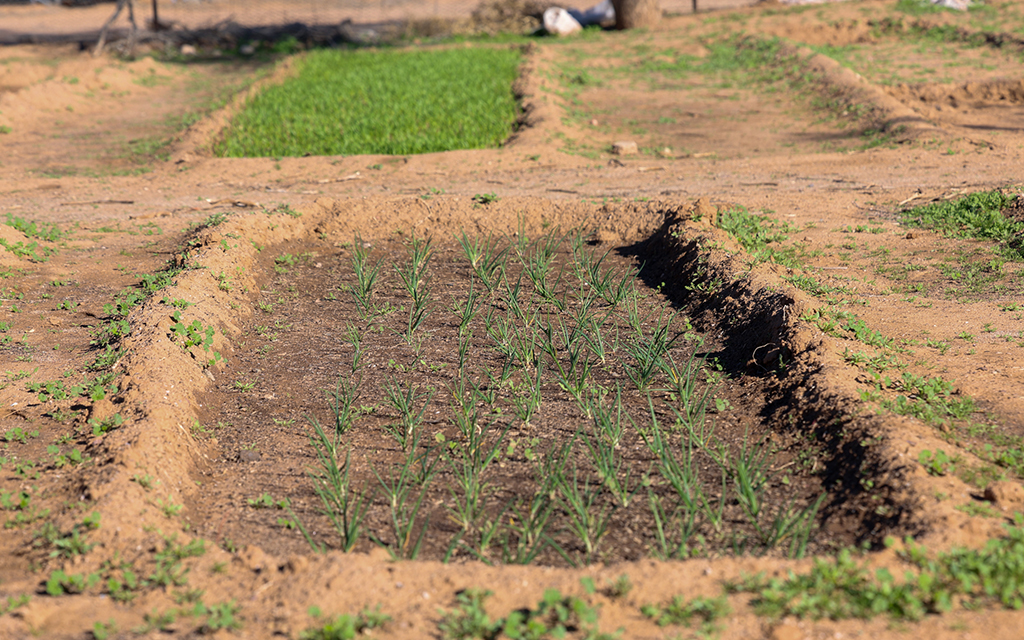
Young shoots poke out of a plot at the Ajo Center for Sustainable Agriculture farm in Ajo on Jan. 31, 2024. (Photo by Harris Hicks/Cronkite News)
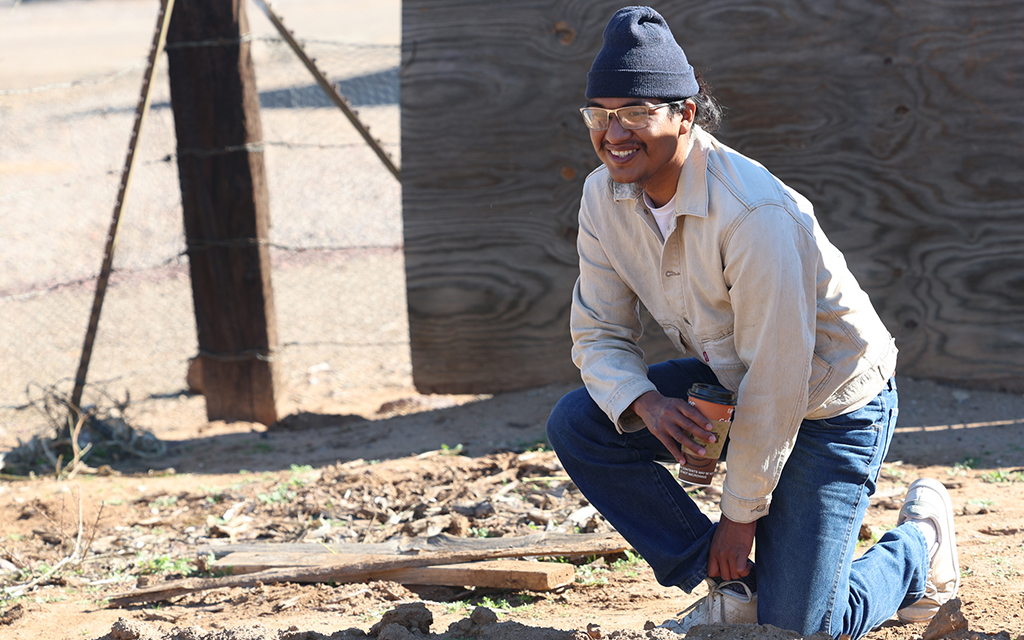
Elijah Marrietta works at the Ajo Center for Sustainable Agriculture farm in Ajo on the Tohono O’odham Nation reservation. Photo taken Jan. 31, 2024. (Photo by Harris Hicks/Cronkite News)
AJO – Jesse Garcia was first introduced to farming in his grandmother’s garden. As a child, he recalls not quite understanding the true purpose of growing and how important it is.
It was in high school that he first started taking an interest in farming and agriculture. After graduating, he had a number of jobs, but he did not feel passionate about any of them. It was then that he found the Ajo Center for Sustainable Agriculture.
Arizona farmers are aging. With a hope to sustain farming practices in the state, particularly within Indigenous communities, the co-executive directors of Ajo CSA, Sterling Johnson and Nina Sajovec, are training the next generation of growers through their beginning farmer apprenticeship program.
As of the 2017 Census of Agriculture from the U.S. Department of Agriculture, 59% of farmers in Arizona were Indigenous, more than any other state. The vast majority of farmers in the U.S. are over the age of 35, with an average age 57.5. With the average age of farmers increasing, advocates say it is important to train the next generation of farmers to maintain the state’s agriculture industry.
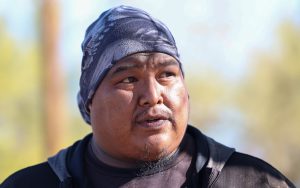
Jesse Garcia shares his experience working with Sterling Johnson in the Ajo Center for Sustainable Agriculture’s beginning farmer apprenticeship program. Photo taken in Ajo on Jan. 31, 2024. (Photo by Harris Hicks/Cronkite News)
“Arizona did things backwards. We became a state. We created a job force. But, we didn’t include farming,” Johnson said. “The wrong assumption was that farming was going to stay within the family, but things have changed. The ways of thinking have changed, the way we do things have changed and there’s no one else to take over.”
The Ajo CSA program trains three to five aspiring farmers like Garcia each cycle in Ajo and on the Tohono O’odham Nation. The eight- to 11-month program allows apprentices to visit local farms, establish their own growing space and attend workshops to learn about local sustainable farming techniques.
The apprentices practice growing and harvesting different varieties of crops each season, including lettuce, tomatoes, chiles, squash, beans and corn. Because the farm is a teaching farm, the produce is not sold, but the organization saves the seeds to distribute throughout the community and use for later growing periods.
Johnson was born and raised on the Tohono O’odham Nation in a ranching and rodeo family. He has overseen more than 40 apprentices and youth interns, 70% of whom are Tohono O’odham.
“I’m very excited that we get to teach them (the apprentices) our ways, and we get to promote our ways. Not just to the outside, but to our people. They should be proud of who they are and where they come from,” Johnson said.
On the Tohono O’odham Nation, the apprentices practice climate-smart agriculture and dryland farming. The three main objectives of climate-smart agriculture are to sustainably increase productivity, adapt to climate change and reduce greenhouse gas emissions. Dryland farming is the practice of producing sustainably by using the soil’s own moisture and limited irrigation to plant and grow.
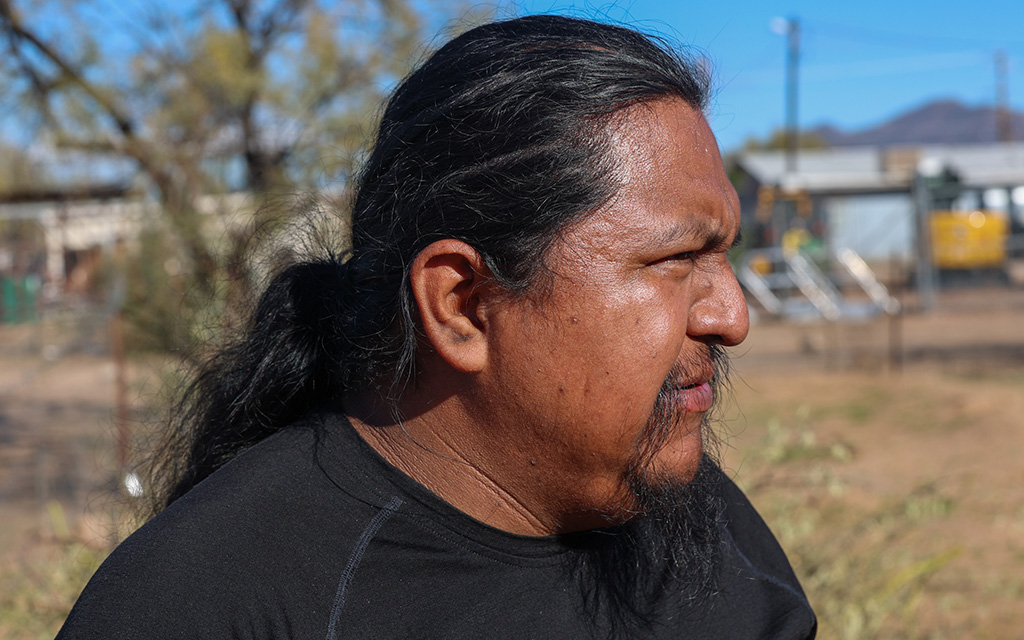
Sterling Johnson, co-executive director of the Ajo Center for Sustainable Agriculture, talks about the organization’s efforts to train the next generation of growers through a beginning farmer apprenticeship program. Photo taken in Ajo on Jan. 31, 2024. (Photo by Harris Hicks/Cronkite News)
“The soils are the key factor in order to have a good nutritious crop. If you overtax those soils, you lose all the nutrients and all the natural things that are in the soils that would be healthy for us as people,” said Michael Kotutwa Johnson, a Hopi farmer and professor at the University of Arizona.
Indigenous farmers have developed and practiced these sustainable farming techniques for generations and they were almost lost, he said. One of the reasons they are successful is because of the adaptation seeds have undergone through the years to grow in desert-like climates.
“Our seeds are like us. They are human beings to the same extent that they also need to be out and adapt to these different environmental conditions. You have organizations … and they’re just holding on to those seeds. They’re also not raising them in the places where they’re from, so they’re losing their chance to adapt,” UArizona’s Johnson said.
Opportunities like the Ajo CSA apprenticeship program give young farmers the chance to get hands-on experience to develop climate-smart agricultural skills and get in touch with Indigenous culture.
“Farming’s a tradition, just like Grandma’s recipe. You don’t want Grandma’s recipe to die out and go away. You got to pass it on,” Gilbert Villegas Jr., an Ajo CSA apprentice, said.
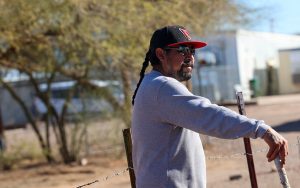
Gilbert Villegas Jr. is an Ajo CSA apprentice and is shown here in Ajo on Jan. 31, 2024. (Photo by Harris Hicks/Cronkite News)
Not only does the apprenticeship build their skills, it prepares them to farm their own land and grow on a larger scale.
Since finding Ajo CSA seven years ago, Garcia said he has learned invaluable information about farming that he has been able to apply to his own farm on the Tohono O’odham Nation.
“Working with Ajo kind of gives you the whole insight of how to run the business: How to apply for grants, how to get partners, how to use those partners, how to organize events – anything that can kind of help your business grow,” he said.
He said building his roots in farming has been a challenge, but he has had incredible mentors like Sterling Johnson that have helped guide him along the way. Garcia now comes back to Ajo CSA as a volunteer and mentor. He hopes to have an impact on those who are in the program now.
“It starts with you as a person. You have to want to change and try to bring everything (the farming techniques) back. If you don’t see the big picture then what’s the point of you trying to spread it?” Garcia asked. “There’s always somebody out there you can go and keep passing it on … hopefully somebody hears.”
Looking toward the future of the program, Sterling Johnson hopes that Native American traditional agricultural practices are given their proper recognition, acknowledgement and respect.
“This is our way of keeping our traditions alive. … We pray for those who are on the ground and those who are on top guiding in this modern world as we need agriculture to have a future for all of us,” Johnson said.
What's Working
-
OnePointOne is Arizona's newest sustainable vertical farm
OnePointOne farm uses vertical farming techniques to grow nutrient-dense, seasonal produce year-round. The farm operates on artificial intelligence and robots tend to the plants. Vertical farming also uses less water and can produce significantly more crops than standard horizontal farms — specifically 250 more plants per acre than traditional farms.Read Full Story


